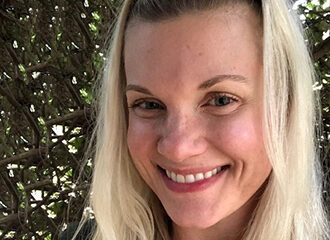By: Lisa Roth, PhD, LPC, Site Director at The Renfrew Center of Chicago, IL
The Merriam-Webster dictionary defines courage as “mental or moral strength to venture, persevere, and withstand danger, fear or difficulty.”
Part of healing, part of living is being able to handle difficult emotions and discomfort. We, as a society, have lots of ways to distract from the day, from our minds, from the feelings in our hearts. We understand that at The Renfrew Center. And we make a different request. Stay in that place. Let’s see what’s there and explore it together. Would this not be the definition of courage?
Think back to places, movements, and experiences you’ve had where you could have shut down and instead chose to be open. What if we looked at those moments and gave ourselves the recognition of being courageous? How would that shape us? Would we see ourselves differently? And how about how we would see/interact with others?
In my time as Site Director at The Renfrew Center of Chicago, I have seen many definitions of courage. I’ve had the pleasure of working with clients both in groups and individually, as well as with families and support people of all ages. It never ceases to amaze me what happens when people are in an environment that allows them to soften into their vulnerability and open to the fears, traumas and calcified narratives that have convinced them they are somehow unworthy or undeserving in some way.
As we all know, eating disorders are emotional disorders and disguise the true pain someone is feeling/holding/carrying. It is here, in treatment, that people can let down their heavy constraints and one by one, start to open to what they have been thinking, sensing, and experiencing, rather than avoiding. No one wakes up in the morning and says to themselves, “You know what? I’m doing to dig into my pain and discomfort today. I’m going to go deep and feel into my authentic truth and speak about what scares and frightens me and process through it.” We don’t do that. Not normally. And yet I see people of all ages doing just this. And yes, we have amazing tools and teachers at Renfrew, but that wouldn’t make a difference without people bringing their full hearts to the work of healing and recovery.
This applies to patients, as well as their support people/family members. I have witnessed parents finding new ways to connect to their children; partners being able to redefine their relationship in the scope of their loved ones being in treatment exhibiting new levels of authenticity and transparency; siblings reconnecting and supporting one another with new levels of understanding. When a loved one is hurting, we all get to be courageous, step out of our comfort zone and keep ourselves open, vulnerable, and curious.
Brené Brown says, “Owning our story can be hard but not nearly as difficult as spending our lives running from it. Embracing our vulnerabilities is risky but not nearly as dangerous as giving up on love and belonging and joy – the experiences that make us the most vulnerable. Only when we are brave enough to explore the darkness will we discover the infinite power of our light.” Courage.
Lisa Roth, PhD, LPC is the Site Director at The Renfrew Center of Chicago, IL. Dr. Roth received a PhD in Clinical Psychology, with an emphasis in Depth Psychology, from Pacifica Graduate Institute, and an MA in Counseling Psychology, with an emphasis in Expressive Arts Therapy, from the California Institute for Integral Studies (CIIS). Prior to Renfrew, she has worked clinically in psychiatric hospitals, domestic violence shelters, community mental health agencies, schools, as part of Child Protective Services, in coordination with probation and the court system, and within youth mentorship programs. Dr. Roth is a member of The International Expressive Arts Therapy Association (IEATA) and The National Child Traumatic Stress Network (NCTSN).




